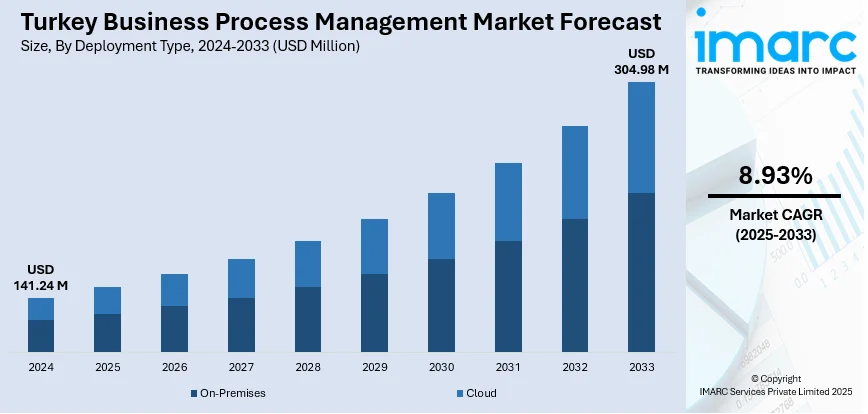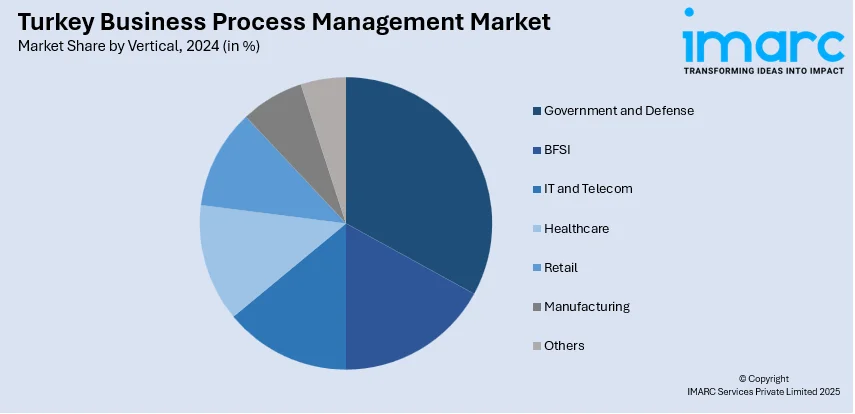
Turkey Business Process Management Market Size, Share, Trends and Forecast by Deployment Type, Component, Business Function, Organization Size, Vertical, and Region, 2025-2033
Turkey Business Process Management Market Overview:
The Turkey business process management market size reached USD 141.24 Million in 2024. Looking forward, IMARC Group expects the market to reach USD 304.98 Million by 2033, exhibiting a growth rate (CAGR) of 8.93% during 2025-2033. At present, Turkish businesses are looking to simplify internal processes, lower overhead costs, and enhance the delivery of services. Moreover, companies across industries are actively transforming digitally to remain viable in a rapidly changing technology environment. This trend, along with the increasing emphasis on compliance and regulatory conformity, is expanding the Turkey business process management market share.
|
Report Attribute
|
Key Statistics
|
|---|---|
|
Base Year
|
2024 |
|
Forecast Years
|
2025-2033
|
|
Historical Years
|
2019-2024
|
| Market Size in 2024 | USD 141.24 Million |
| Market Forecast in 2033 | USD 304.98 Million |
| Market Growth Rate 2025-2033 | 8.93% |
Turkey Business Process Management Market Trends:
Heightened Demand for Cost Savings and Operational Efficiency
Turkish businesses are looking to simplify internal processes, lower overhead costs, and enhance the delivery of services. Organizations are constantly streamlining their processes to remove duplications, reduce manual interventions, and enhance automation of workflows. This continuous evolution is helping companies remain competitive in a market that is becoming increasingly digitized and customer-focused. Organizations are proactively replacing conventional processes with cloud-based business process management (BPM) solutions to enable real-time tracking, improved resource deployment, and lower turnaround times. In addition, the pandemic-driven focus on agility and resilience is pushing organizations to invest in BPM solutions that enable remote collaboration and cross-functional process transparency. Consequently, BPM is helping Turkish companies to operate more effectively while reducing costs of operations and assuring quality in their products.

To get more information on this market, Request Sample
Increasing Digital Transformation Throughout Industries
Turkey's BPM market is experiencing rapid growth as companies across industries are actively transforming digitally to remain viable in a rapidly changing technology environment. Organizations are adopting cloud computing, artificial intelligence (AI), and robotic process automation, all of which need a solid BPM base to achieve the best possible outcomes. Turkish businesses are using BPM platforms to digitalize back-end systems, consolidate disparate processes, and increase data-driven decision-making power. This growth can be seen strongly in the finance, retail, logistics, and telecom sectors, where the need for adaptable and expandable process models is growing strongly. The government's digital plan and policies are also promoting companies to implement smart technology, thereby driving BPM implementation even further. Businesses are always on the lookout for improving customer experiences, and BPM systems are offering them the framework and analytics required to drive end-to-end digital processes efficiently, thus driving the market ahead. In 2025, almost 100 Turkish tech startups seeking to enter international markets will get assistance to attend significant global entrepreneurship and technology events in Portugal, Finland, the United States, and Qatar. The initiative, managed by the Ministry of Industry and Technology, is a component of the nation's ongoing "National Technology Initiative," aimed at fostering local innovation and technology-led growth.
Increasing Emphasis on Compliance and Regulatory Conformity
Turkish companies are turning to keep their operations in sync with changing local and global regulations, and this is supporting the Turkey business process management market growth. Organizations are constantly battling a complicated regulatory framework, particularly in industries like banking, healthcare, and manufacturing, where non-compliance errors can lead to large fines and loss of reputation. BPM software is being utilized to record, track, and audit business processes in real time to ensure firms remain compliant with regulations and country-specific data protection regulations. Turkish companies are proactively adopting BPM software to automate procedures, monitor regulatory updates, and realize accountability among departments. The trend is further driven by heightened oversight from regulatory agencies as well as customer demands for ethical business conduct. Through providing transparency, traceability, and audit readiness, BPM platforms are emerging as a necessity for ensuring organizations remain continuously compliant and prevent legal risks. For instance, in 2024, Rossmann Turkey, the top Turkish personal care retailer, chose RELEX Solutions, a provider of integrated supply chain and retail planning solutions, to enhance their forecasting and replenishment operations throughout their supply chain. Rossmann Turkey aims to enhance the availability of promotional products and minimize surplus stock, with the goal of automating and optimizing inventory planning and forecasting comprehensively.
Turkey Business Process Management Market Segmentation:
IMARC Group provides an analysis of the key trends in each segment of the market, along with forecasts at the country and regional levels for 2025-2033. Our report has categorized the market based on deployment type, component, business function, organization size, and vertical.
Deployment Type Insights:
- On-Premises
- Cloud
The report has provided a detailed breakup and analysis of the market based on the deployment type. This includes on-premises and cloud.
Component Insights:
- IT Solution
- Process Improvement
- Automation
- Content and Document Management
- Integration
- Monitoring and Optimization
- IT Service
- System Integration
- Consulting
- Training and Education
The report has provided a detailed breakup and analysis of the market based on the component. This includes IT solution (process improvement, automation, content and document management, integration, and monitoring and optimization) and IT service (system integration, consulting, and training and education).
Business Function Insights:
- Human Resource
- Accounting and Finance
- Sales and Marketing
- Manufacturing
- Supply Chain Management
- Operation and Support
- Others
The report has provided a detailed breakup and analysis of the market based on the business function. This includes human resource, accounting and finance, sales and marketing, manufacturing, supply chain management, operation and support, and others.
Organization Size Insights:
- SMEs
- Large Enterprises
The report has provided a detailed breakup and analysis of the market based on the organization size. This includes SMEs and large enterprises.
Vertical Insights:

- Government and Defense
- BFSI
- IT and Telecom
- Healthcare
- Retail
- Manufacturing
- Others
A detailed breakup and analysis of the market based on the vertical have also been provided in the report. This includes government and defense, BFSI, IT and telecom, healthcare, retail, manufacturing, and others.
Regional Insights:
- Marmara
- Central Anatolia
- Mediterranean
- Aegean
- Southeastern Anatolia
- Black Sea
- Eastern Anatolia
The report has also provided a comprehensive analysis of all the major regional markets, which include Marmara, Central Anatolia, Mediterranean, Aegean, Southeastern Anatolia, Black Sea, and Eastern Anatolia.
Competitive Landscape:
The market research report has also provided a comprehensive analysis of the competitive landscape. Competitive analysis such as market structure, key player positioning, top winning strategies, competitive dashboard, and company evaluation quadrant has been covered in the report. Also, detailed profiles of all major companies have been provided.
Turkey Business Process Management Market Report Coverage:
| Report Features | Details |
|---|---|
| Base Year of the Analysis | 2024 |
| Historical Period | 2019-2024 |
| Forecast Period | 2025-2033 |
| Units | Million USD |
| Scope of the Report | Exploration of Historical Trends and Market Outlook, Industry Catalysts and Challenges, Segment-Wise Historical and Future Market Assessment:
|
| Deployment Types Covered | On-Premises, Cloud |
| Components Covered |
|
| Business Functions Covered | Human Resource, Accounting and Finance, Sales and Marketing, Manufacturing, Supply Chain Management, Operation and Support, Others |
| Organization Sizes Covered | SMEs, Large Enterprises |
| Verticals Covered | Government and Defense, BFSI, IT and Telecom, Healthcare, Retail, Manufacturing, Others |
| Regions Covered | Marmara, Central Anatolia, Mediterranean, Aegean, Southeastern Anatolia, Black Sea, Eastern Anatolia |
| Customization Scope | 10% Free Customization |
| Post-Sale Analyst Support | 10-12 Weeks |
| Delivery Format | PDF and Excel through Email (We can also provide the editable version of the report in PPT/Word format on special request) |
Key Questions Answered in This Report:
- How has the Turkey business process management market performed so far and how will it perform in the coming years?
- What is the breakup of the Turkey business process management market on the basis of deployment type?
- What is the breakup of the Turkey business process management market on the basis of component?
- What is the breakup of the Turkey business process management market on the basis of business function?
- What is the breakup of the Turkey business process management market on the basis of organization size?
- What is the breakup of the Turkey business process management market on the basis of vertical?
- What is the breakup of the Turkey business process management market on the basis of region?
- What are the various stages in the value chain of the Turkey business process management market?
- What are the key driving factors and challenges in the Turkey business process management market?
- What is the structure of the Turkey business process management market and who are the key players?
- What is the degree of competition in the Turkey business process management market?
Key Benefits for Stakeholders:
- IMARC’s industry report offers a comprehensive quantitative analysis of various market segments, historical and current market trends, market forecasts, and dynamics of the Turkey business process management market from 2019-2033.
- The research report provides the latest information on the market drivers, challenges, and opportunities in the Turkey business process management market.
- Porter's five forces analysis assist stakeholders in assessing the impact of new entrants, competitive rivalry, supplier power, buyer power, and the threat of substitution. It helps stakeholders to analyze the level of competition within the Turkey business process management industry and its attractiveness.
- Competitive landscape allows stakeholders to understand their competitive environment and provides an insight into the current positions of key players in the market.
Need more help?
- Speak to our experienced analysts for insights on the current market scenarios.
- Include additional segments and countries to customize the report as per your requirement.
- Gain an unparalleled competitive advantage in your domain by understanding how to utilize the report and positively impacting your operations and revenue.
- For further assistance, please connect with our analysts.
 Request Customization
Request Customization
 Speak to an Analyst
Speak to an Analyst
 Request Brochure
Request Brochure
 Inquire Before Buying
Inquire Before Buying




.webp)




.webp)












